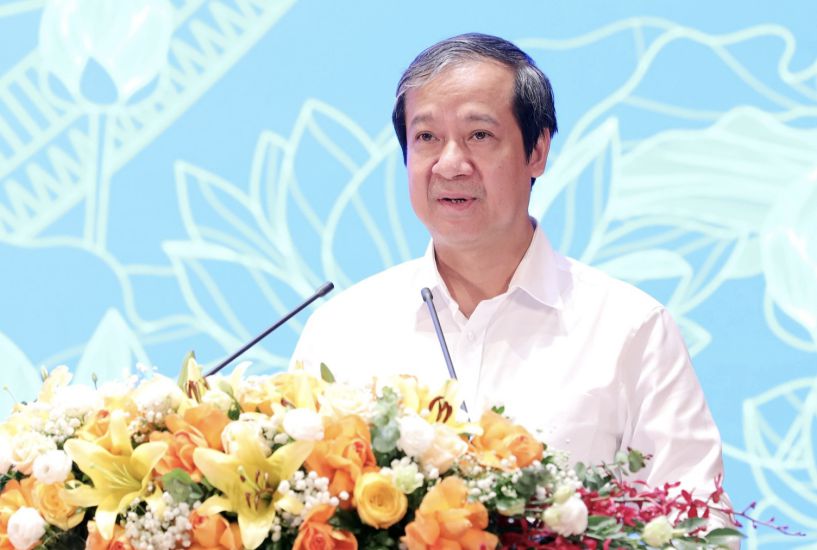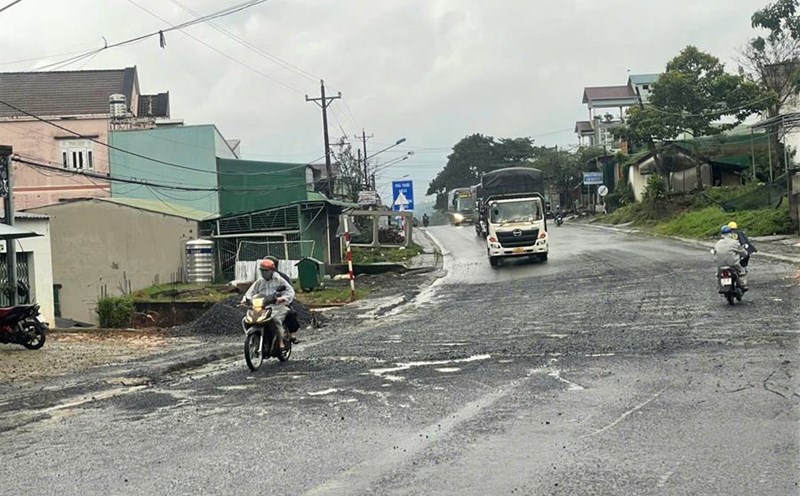This school year is also the first year that the education sector has operated according to the two-level local government model. This requires the education sector to proactively demonstrate their mettle and responsibility.
Support from local authorities at two levels
In order to facilitate people in accessing and performing administrative procedures, the People's Committee of My Huong commune, Can Tho city has just issued a plan to implement the model "mobile public administration associated with the 2025 school opening season" in the commune.
The model aims to meet the increasing demand for administrative procedures at the beginning of the new school year, such as: Issuing birth certificates, confirming household registration, authenticating student records, documents related to social protection, school health... At the same time, reducing travel time, creating convenience for parents and students, especially in remote areas, ethnic minority areas with many difficulties.
It is expected that the model will be held on Saturdays in August 2025 at a hamlet community house, school or other suitable location. Procedures are deployed mobilely including: Citizenship (new birth/re-register), authentication of educational documents, confirmation of poor and near-poor households, student allowance records, school health, confirmation of residence, online application consultation via the National Public Service Portal or VNeID application.
In Hanoi, in the first week of operation of the two-level government, Giang Vo ward deployed the "gool Digital Classroom" model, expected to equip 170 computers for 3 classes 6A1, 6A6, 6A9. The school is oriented to become the first Google digital school in Hanoi and the whole country. Meanwhile, Bo De ward has a project to apply AI in smart classrooms for preschool and primary school.
Previously, many educational tasks were undertaken by the Department of Education and Training. After operating the local government at two levels, the Ministry of Education and Training issued circulars guiding many authorities on education to transfer to the People's Committees at the commune level: granting secondary school graduation certificates, deciding to transfer to secondary schools, selecting textbooks, organizing excellent teacher competitions, considering secondary school graduation...
This change helps the commune level directly participate in management, coordinate with schools, parents and the community to improve the quality of education.
The path for the country to develop prosperously and sustainably
Breakthrough education policies from the beginning of this school year are associated with the process of building a lifelong learning movement, "leaving no one behind" in education.
General Secretary To Lam, in the article "Lifetime learning" published in March 2025, emphasized: "Lifetime learning helps each member of society have the conditions and opportunities to improve themselves, improve the quality of life of themselves, of their families, clans, villages, hamlets, wards, communes and the whole country under the leadership of the Party on the path to becoming a rich people's country, a strong country, democracy, fairness, civilization and socialism".
The national tuition exemption policy for high school students - a policy that experts consider "historic", puts Vietnam in the group of not many countries that have applied it to phoise completely without collecting tuition fees.
Speaking at the 8th Session of the 15th National Assembly, National Assembly Delegate Nguyen Thi Kim Thuy (Da Nang) commented: "School fees are a step in the right direction, not only reducing the financial burden on millions of families but also a strong commitment of the State to social justice".
According to preliminary calculations by the Ministry of Finance, when the policy is fully implemented, about 22.3 million students will benefit, equivalent to saving more than 20,000 - 25,000 billion VND per year for households.
But it is worth mentioning that this policy is changing the way of looking at education: From being a family obligation, general education has now become a responsibility of the State and a universal right of all citizens.
General Secretary To Lam, in many recent speeches, has continuously emphasized the key role of education in the country's recovery: "Education is the top national policy. A nation cannot develop if the young generation is left behind due to poverty, lack of schools, lack of classes. We must unlock all resources so that children in any region have the right to dream, the right to study and the right to develop".
That viewpoint is concretized through the two decisions just mentioned - not simply supporting social security, but strategic investment to create sustainable development. Building schools and exempting tuition fees is creating an environment for intelligence to be nurtured, high-quality human resources to be formed right from the root.
Economic expert Pham Chi Lan commented: The limited choice of investment in education in the fiscal period shows that the Party and State have a long-term view. In the long term, no infrastructure brings about the same efficiency as human infrastructure".
Proactive and strong changes are needed in the education sector
However, for these two major decisions to truly create a breakthrough, synchronous movements are needed. Typically, the quality of the teaching staff must be improved, especially in border areas, where there is a shortage of both teachers and minimum living conditions for teachers. To do this, a solution has been proposed to increase teachers' income.
On June 16, 2025, the 15th National Assembly officially passed the Law on Teachers - the first specialized law that fully stipulates the legal position, rights, obligations and policies for the teaching staff. Notably, the law stipulates that teachers will be ranked at the highest salary level in the administrative career salary scale system, effective from January 1, 2026.
For the first time in history, the teaching staff is recognized as people with special professions, equivalent professional standards, rights and obligations, instead of just workers signing contracts as before.
Ms. Nguyen Thi Hong - a teacher at Trang An Kindergarten (Quang Ninh) - shared: "When they are given the highest salary, teachers must also demonstrate their worthy professional values. Increasing salaries is a way to improve the quality of education, not only in income but also in responsibility".
Meanwhile, Ms. Trinh Thi Thu Sinh - a teacher at Na Bai Kindergarten (Son La) - frankly said: "A commensurate salary will help teachers feel secure in their profession, and can accept teaching in remote, isolated, and border areas, thereby improving the quality of education".
The decision to exempt tuition fees and support tuition fees helps increase the rate of universal education and reduce inequality. The campaign to build boarding schools in border areas helps attract ethnic minority, remote and isolated students to class, while creating a system of on-site staff for the future. Both policies promote social significance, reduce multidimensional poverty, increase labor productivity and foster national spirit early.
These are also policies that not only continue the tradition of "for the people" of the Party, but also a historic turning point, demonstrating a vision and the courage to commit to reform.
Today's education is the national destiny for tomorrow. From village classes to big cities, from the footsteps of the highlands to the dream of studying abroad, starting a business, integrating - all are being extended by decisions of the times.
Students from preschool to grade 12 are exempted from tuition fees. This is a huge effort and this amount is calculated from the saved sources, when streamlining the apparatus, it does not affect other costs".
(General Secretary To Lam spoke at the meeting with revolutionary veteran delegates, pre-upratory delegates, Vietnamese Heroic Mothers, generals, and Heroes of the People's Armed Forces on the occasion of the 78th anniversary of the War Invalids and Martyrs Day; 80 years of the successful August Revolution and the National Day of the Socialist Republic of Vietnam on July 31, 2025)
Party Central Committee member, Minister of Education and Training Nguyen Kim Son: Opening the way for education to enter a new era

The 2025-2026 school year takes place at a time when many special factors when new personnel, arrangement, organization of the apparatus and operation of the two-level government are the moment and time for the country to change and the education sector also operates with the country. If the country faces a breakthrough, it is impossible not to develop education and training.
Our challenge is not only to cope with difficulties and poverty, but also to cope with the challenges of development. Our great mission is not developing, which is a big mistake.
At this time, it is necessary to do a good job of "managing change". If this is not done well, it will greatly affect the work being implemented by the education sector. We make education a model for the whole society. Therefore, in this context, it is necessary to unite, share, be sincere, and be sincere with each other.
Opening the new school year, but also opening the education sector to enter a new era. This is also the time to celebrate the 80th anniversary of the education sector. That affirms that we do not stand outside, do not go to the edge but inside, which is the goal of national development.
(Minister of Education and Training Nguyen Kim Son spoke at the 2025 Department of Education and Training Directorate Conference, held on July 29).











